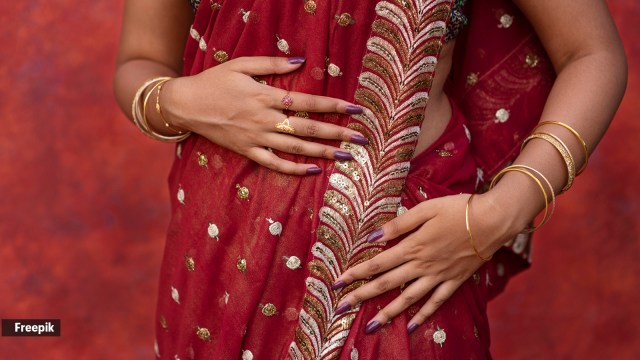📣 For more lifestyle news, click here to join our WhatsApp Channel and also follow us on Instagram
Why experts want you to refrain from tying sari, dhoti, or salwar cords too tightly around the waist
Early symptoms to watch out for include persistent skin lesions or ulcers on the waistline
 Learn about "petticoat cancer," a rare skin cancer linked to traditional saree dressing practices (Source: Freepik)
Learn about "petticoat cancer," a rare skin cancer linked to traditional saree dressing practices (Source: Freepik)Wearing a sari is a time-honoured tradition; mostly worn with a petticoat tied directly at the waist. However, a recent report published in BMJ Case Reports has highlighted an alarming risk associated with this practice.
Referred to as “petticoat cancer,” this rare skin condition develops due to chronic friction and pressure from tightly tied waist cords, which can ultimately lead to a specific type of skin cancer known as Marjolin ulcers.
Understanding petticoat cancer and its risks
Doctors observed that the tightly bound waist cord used in traditional sari dressing exerts constant pressure and friction against the skin, especially when worn daily for extended hours.
According to Dr Mangesh P Kamath, Additional Director of Medical Oncology at Fortis Hospital in Bangalore, constant pressure can lead to skin thinning, erosion, and eventually ulceration, creating a non-healing wound that may undergo cancerous change.
When left untreated, these ulcers can transform malignant into squamous cell carcinoma, also known as Marjolin ulcers. These findings emphasise that the tightly tied cord, not the sari, is the primary culprit in the development of these cancerous ulcers.
Early-stage squamous cell carcinoma can often be treated effectively, with surgical excision, radiation therapy, and sometimes topical treatments, said Dr Kamath. The five-year survival rate is over 90% for early detection. However, the prognosis depends on the size, depth, and extent of cancer spread. Advanced cases have a five-year survival rate of around 50%, which underscores the importance of early diagnosis and intervention.
 If these symptoms are noticed, prompt medical attention is crucial, as early-stage detection of squamous cell carcinoma significantly improves treatment outcomes. (File photo)
If these symptoms are noticed, prompt medical attention is crucial, as early-stage detection of squamous cell carcinoma significantly improves treatment outcomes. (File photo)
Early signs of petticoat cancer
Early symptoms to watch out for, according to Dr Kamath, include:
- Persistent skin lesions or ulcers on the waistline
- Redness, itching, or burning sensations
- Skin thickening or depigmentation
- Pain, discomfort, or unusual bleeding
- Gradual growth of the lesion over time
If these symptoms are noticed, prompt medical attention is crucial, as early-stage detection of squamous cell carcinoma significantly improves treatment outcomes.
Preventive measures
While the findings may sound concerning, Dr Kamath said there are steps individuals can take to prevent this rare condition:
- Avoid Tightly Tied Cords: Refrain from tying saree, dhoti, or salwar cords too tightly around the waist. Instead, opt for looser, adjustable waistbands that reduce pressure on the skin.
- Wear Comfortable Fabrics: Choose soft, breathable materials that minimize friction and moisture buildup. Cotton or lightweight, natural fabrics are recommended to allow the skin to breathe.
- Regular Skin Checks: Inspect your waistline regularly for any unusual changes, particularly for persistent lesions or irritation.
- Practice Good Hygiene: Clean and moisturise the skin regularly to reduce the risk of inflammation and friction-related damage.
- Seek Professional Help for Persistent Issues: If any skin irritation, wound, or lesion doesn’t heal over time, consult a dermatologist or oncologist for an assessment.
DISCLAIMER: This article is based on information from the public domain and/or the experts we spoke to. Always consult your health practitioner before starting any routine.
📣 For more lifestyle news, click here to join our WhatsApp Channel and also follow us on Instagram







- 018 hours ago
- 028 hours ago
- 038 hours ago
- 048 hours ago
- 058 hours ago




















